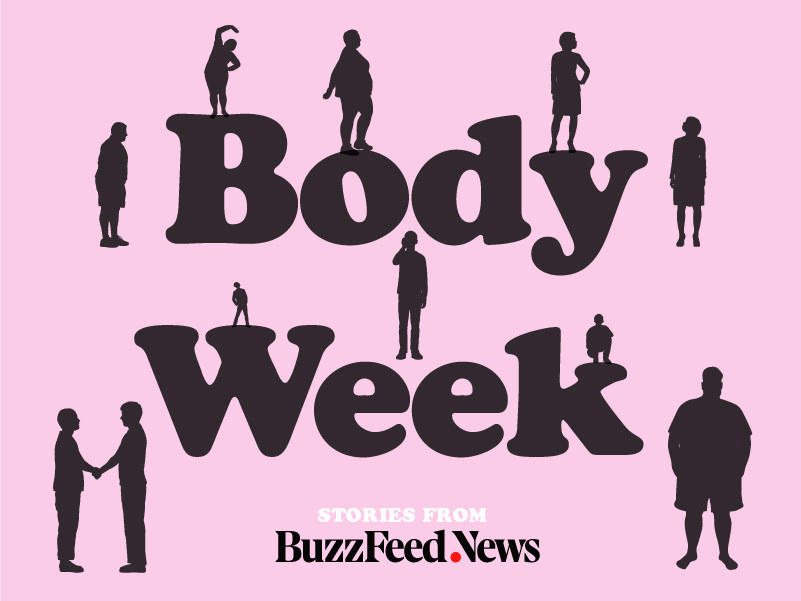Every aspect of our lives has been reconfigured during the pandemic. For many people, this has meant experiencing changes in their gender identity or gender presentation.
Sheryl*, a 30-year-old Brooklyn-based trans woman working in business administration, said she connects the prolonged period of social isolation with her own transition experience a decade ago. “For me, in the beginning of my transition, while I was learning how to dress myself and how to safely move through the world, I was treated hatefully for it a lot,” she said. “I would avoid going out during certain times; I was threatened, harassed, and followed. The amount of trauma... I don’t think my brain allowed me to recognize how difficult it was to move through the world at that time. Once I started passing, that didn’t happen as much, but my brain will never be able to let go of that when I leave the house. Before [the pandemic], a lot of transexual women were experiencing this, where you’re just exhausted by carrying yourself through a world that was not made for you. That ends up translating to spending a lot of time inside.”
Dulcinea Pitagora, an NYC-based psychotherapist and sex therapist, suggested that for people working from home, “there might be more of a willingness to take risks in terms of gender presentation and expression when interacting with others from the safety of our own space, knowing there’s always an option to turn off the screen at any time if we don’t feel safe.”
That said, not everyone is experiencing positive or affirming changes to their gender because of the conditions created by the pandemic, especially those who feel most affirmed within their communities. Still, many people are taking time to think more deeply about their gender and how it plays out in the world at large, whether that means not shaving for a prolonged period of time, choosing different clothing, or adjusting their pronouns in their Zoom window.
I opened my inbox to people who are experiencing changes in their gender during the pandemic. Here are a few of their stories.
Alex (they/them), nonbinary, 20, white, Ontario, Canada, currently unemployed
Since the pandemic began and I’ve mostly been stuck at home with my family, I’ve noticed that I have felt less pressure to present myself as feminine. Because I’m at home, I can justify wearing clothing that is more gender-neutral or “masculine” in nature. I suppose the pressure of feeling like I have to present myself a certain way in public because of my assigned gender at birth has been lifted. I cut my hair to a shorter length and don’t really care anymore about what gender I appear to be. I’m just living as me and I’m fine with that.
"I don’t want to be male or female, I just wanna be Alex, you know? Plain old Alex."
I began feeling gender dysphoria in high school, and needless to say, it kicked my ass. I despised being female. I had a group of Catholic friends who thought all their problems could be solved by praying to God or Jesus, or whatever. Not to be bitter, I respect people’s beliefs and religious practices, but these “friends” forced me back into the closet when I opened up to them about my uncertainties surrounding my gender identity. Around this time, I was also forced to come out to my mother because of different circumstances, and she essentially told me to not tell anyone about it and to just go back to being “normal.” Fun times!
There are days where I fantasize about not having breasts, and there are days where I love my breasts. Same goes with my genitalia. Sometimes I like my vagina; sometimes I wish I had a penis. I wish I could just flip between the two whenever I wanted, while also being considered genderless. I don’t want to be male or female, I just wanna be Alex, you know? Plain old Alex.
In a way, the pandemic has been a very, very small positive to me, as it has allowed me to just reflect on myself and come to terms with my identity. If I hadn’t literally been forced to stop going out and thus feel the pressure to conform to a certain gender norm, I probably would have taken a lot longer to accept who I am. Of course, now I’m ready for the pandemic to be over so I can flaunt my nonbinary ass around in public, but alas, I must wait for that day.
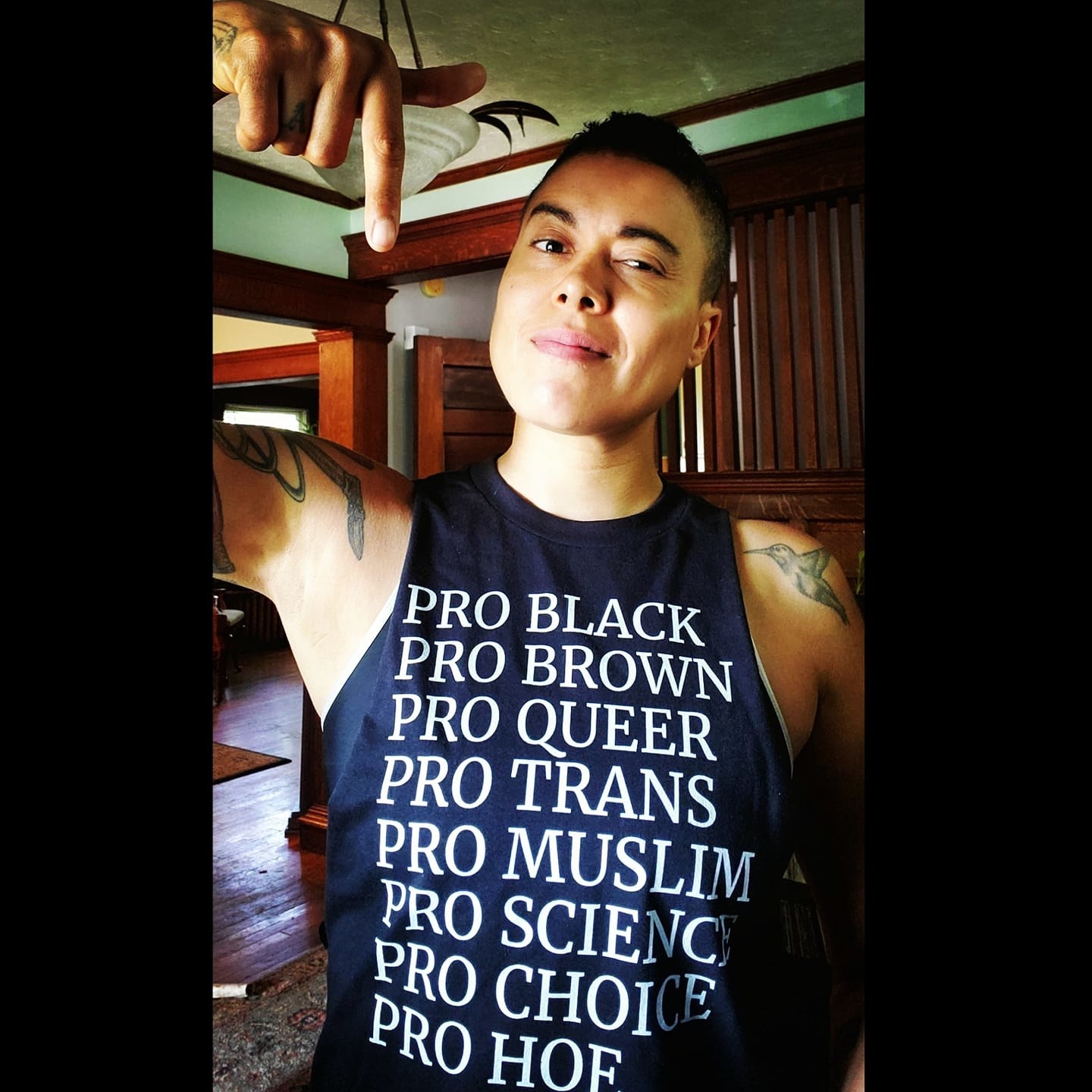
Seven (they/them), nonbinary, 39, Black, Minneapolis, metal fabricator
[Since the pandemic began] I started taking T. I've grown some body hair and gained 20 pounds of muscle mass since July. As a queer Black human, I've had to deal with other people’s uncomfortable feelings my whole life. I'm tired. I've known I was nonbinary my entire life but felt as though it wasn't safe to express myself. Dysphoria is sneaky and complicated. I think I spent a good chunk of my life trying to bury it. Honestly, I've felt so at peace internally since I officially came out and started T in July. I finally stopped digging that hole. It's a beautiful thing to finally rest my mind. [I’ve talked about these changes with] my wife. I'm kinda letting it present naturally. Changes are happening and people will obviously notice them. How I communicate, love, and go about the world have not shifted.
Without this pandemic and more importantly the civil unrest that ignited through the murder of George Floyd, I would not have truly acknowledged my authentic self. I wouldn't have started on my current path to live the rest of my life unphased by what might make others uncomfortable. With a world of uncertainty, I feel it's time to make the most important things within ourselves certain.
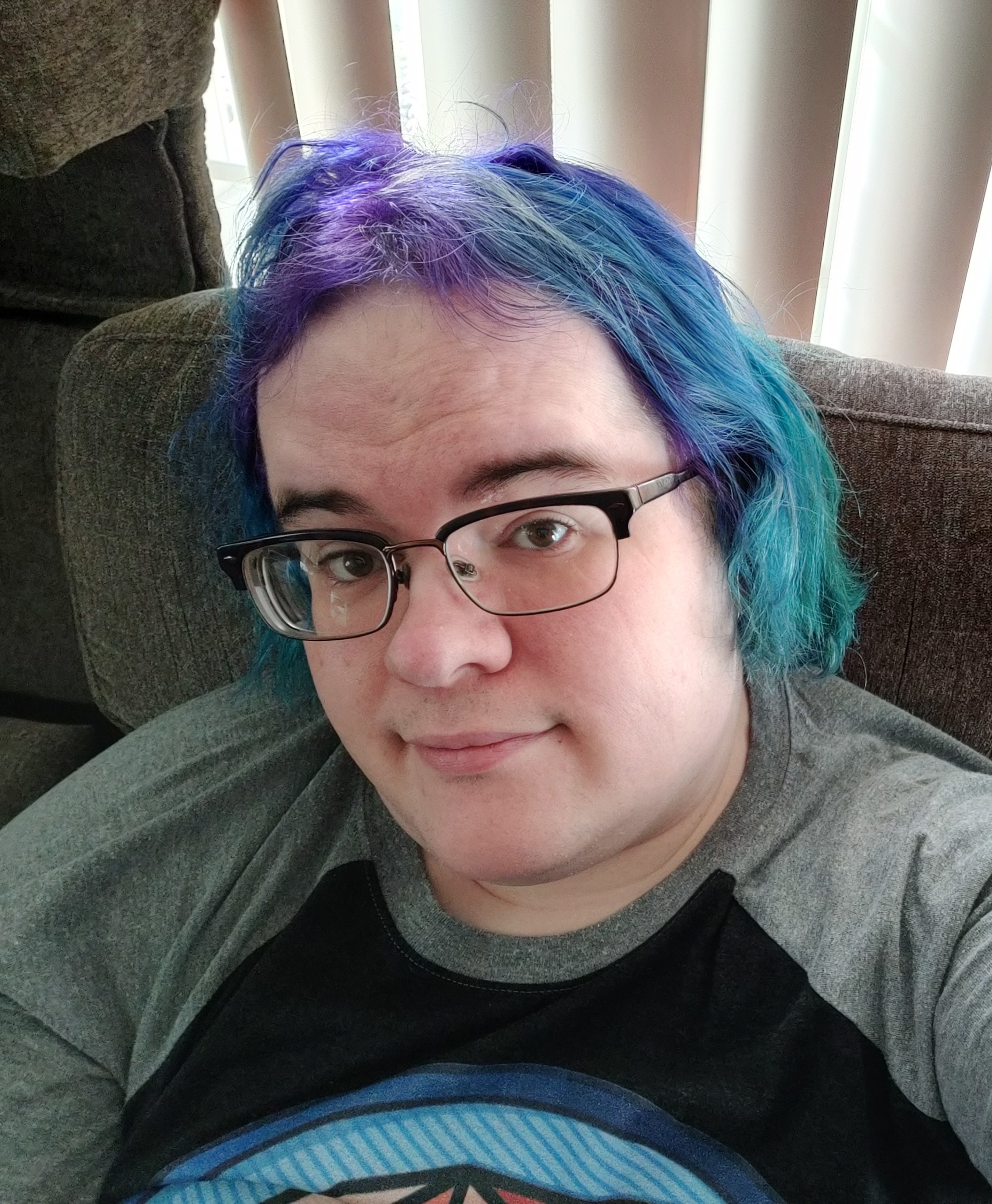
JoAnne (she/her), Delaware, teacher
I was given the name John at birth, but even as a kid, I would refer to myself as JoAnne other than at work. My pronouns were they/them, but this year they are she/her. As soon as I am able to meet with people at work, I will be presenting as female completely.
I live about 30 miles from Philadelphia, in a small college town. Even though we're in the South culturewise, it’s very LGBTQI friendly. I live with two other people: my wife, who refers to me as her wife, and our boyfriend. We've been a triad for the last five years, and he considers himself as living with two women.
"In other words, there was no reason to be anyone other than JoAnne."
I'm a teacher, college level, and since the pandemic started, I've been teaching remotely. At work I present as male, though that will change in the future, I'm sure. Before the pandemic, I was more gender-neutral, in that I split my time between my male and female sides. At home I was always female but outside the home, with family, I was John. Since the pandemic, I'm 99.9% female. The pandemic, because it enforced certain isolation, gave me the freedom to just stay female — to the point where I'm forgetting what it was like to be male. In other words, there was no reason to be anyone other than JoAnne.
I remember a few years ago I was talking to a friend and I broke down crying and just screamed, "I'm the wrong sex." That was the start of a long period of coming to terms with who I am. I confessed to my wife about how unhappy I was and how I felt like I was in the wrong skin. I went to therapy, which helped.
It took the pandemic, really because you're home more and less distracted, to give me time to really work through my gender issues and to work through them with my wife and boyfriend. The good thing is they accept JoAnne and encourage me as I am.
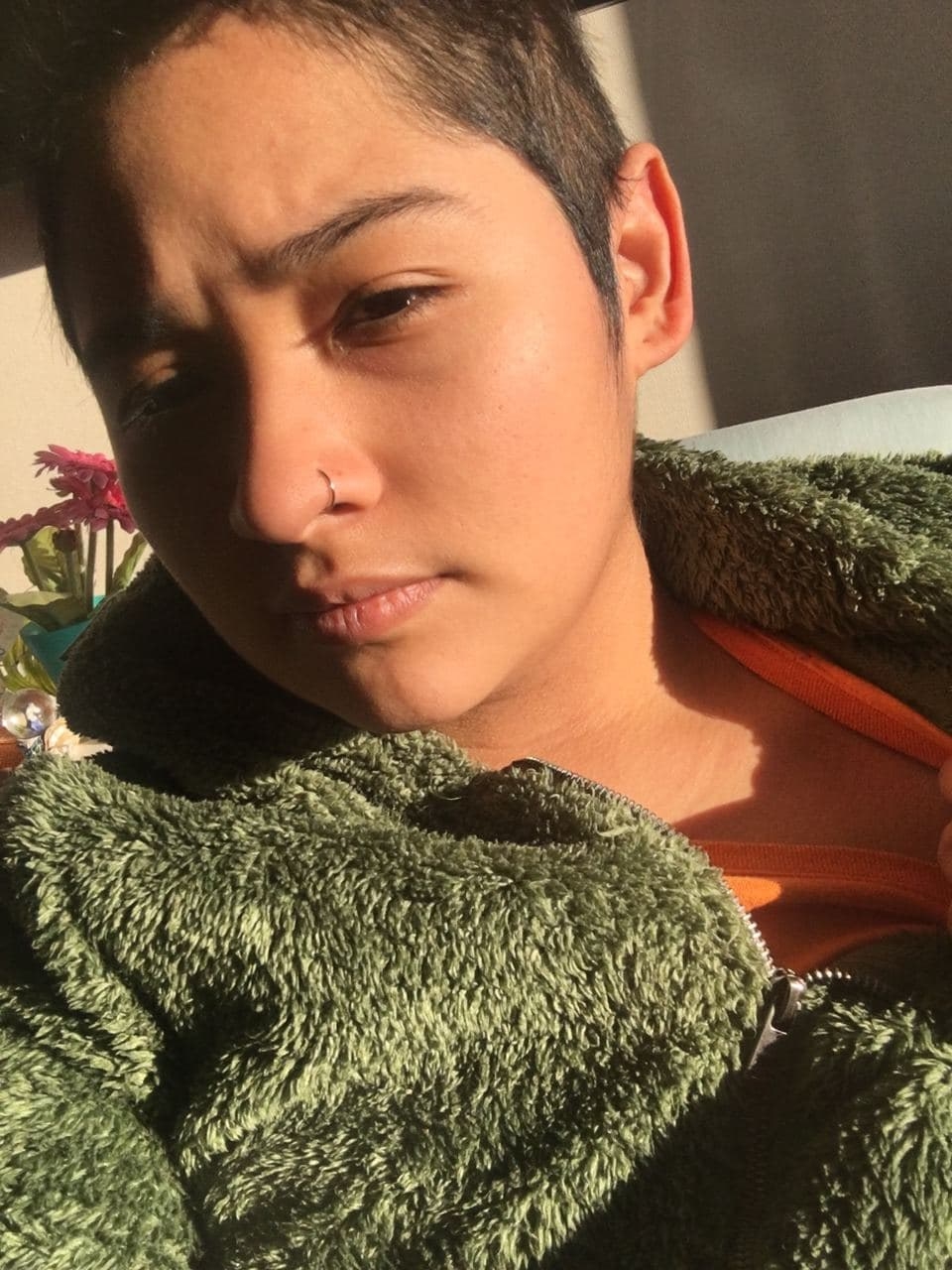
Fanfi (he/she, prefers “he”), 25, brown/mixed, Santiago, Chile, freelance artist
I’m from Santiago de Chile. I live with my nonbinary Venezuelan partner. They have been “out” since way before the pandemic.
Honestly I didn’t feel too strongly about [my gender presentation]. [I used] “cis female,” “woman,” or “femme” at times when I felt particularly lesbian. I am not a woman. I am not a man. I am both a woman and man, only if those are used together. I am a boy, a really pretty one actually. I want to feel masculine. I want to be seen by masculine people who are not cis. That’s what I feel.
"I want to feel masculine. I want to be seen by masculine people who are not cis. That’s what I feel."
I always dyed my hair pink and cut it at a particular queer stylist, but since we were all quarantined, it was closed for months. My hair grew, my color faded, and I started feeling very uncomfortable. I knew I had to make a change so my partner shaved my whole head, and as the layers of hair came off, I saw who I could be: a boy. I didn’t know it until I started crying while looking at packers giveaways that were only for “trans and nonbinary people” when I was “cis,” but that was the start of it. Now I own a packer that I wear daily if possible, only own a pair of male jeans, and use my partner’s binder when they aren’t. Still waiting for mine!
I have a hard time understanding dysphoria. It sounds so terrifying I keep thinking I must not have it, but I also do not have a name for the earth-shattering dread I feel when I try to feel my own vagina. I have never wanted to look at it. I have ignored it most of my life. It felt dreadful wearing a binder the first time too. I thought my tits were gone, and I was scared of [a permanent change]. I feel different about it now, though.
Euphoria I can understand, as I put on my new pair of jeans and read “for men” on the label, as my friends and partner call me masculine terms of endearment. And I managed to pee standing for the first time! It’s great. It makes my day.
I’m almost certain I would have kept living as I did were it not for the pandemic. I have a complicated relationship with my mother and immediate family. I try hard to please them. I was always too busy trying to be a pretty woman, to be a lovable, acceptable lesbian for them. The quarantine worked for me as a chrysalis stage: I kept myself still, but so much was happening inside me from this lack of movement. For the first time, I asked myself what I wanted to be without the eyes of others upon me. This was the answer, and it’s still developing. It’s been such a hard year — I feel frail and also the happiest I’ve been in my body.
Ilde Senescence, she/her/hers, 35, white Jewish trans demigirl
"The pandemic represents about three-quarters of the time I've been on estrogen and progesterone hormone replacement."
The pandemic created conditions for me to be away from contact with (and more importantly the eyes of) most people, [especially] cis people. I had ideal conditions for taking on appearance changes that would otherwise seem drastic, and the space and time to puzzle out my feelings about and understanding of my gender. While this period also included health scares for me, the flexibility of working under pandemic conditions allowed me to recover.
I have grown out my hair longer than it's been in my life and colored it an ombre purple-blue-cyan. I have embraced my emotions and my mood in a way I had not understood prior in the least. The pandemic represents about three-quarters of the time I've been on estrogen and progesterone hormone replacement, so I have seen a number of appearance, functional, and emotional changes simply from that.
My dysphoria has manifested in the past as a fear of not passing, of not feeling my gender intensely or demonstrating it authentically enough, that I wasn't "worthy" of being trans, or that I couldn't present any way other than "diet male." Physically, my body hair has been the primary source of my dysphoria. My biggest sources of gender euphoria have been the changes to my hair, and buying more femme clothes from Torrid, but also in being able to wear a mask and how that has helped me to be passed by cis people in multiple situations.
I have a medium-sized set of trans friends in the area and my roommate. I've talked to them all at length, and we've celebrated each other’s positive gender feelings due to the pandemic. I also have a psychotherapist who is trans, and with whom I've shared feelings about my transition and the pandemic.
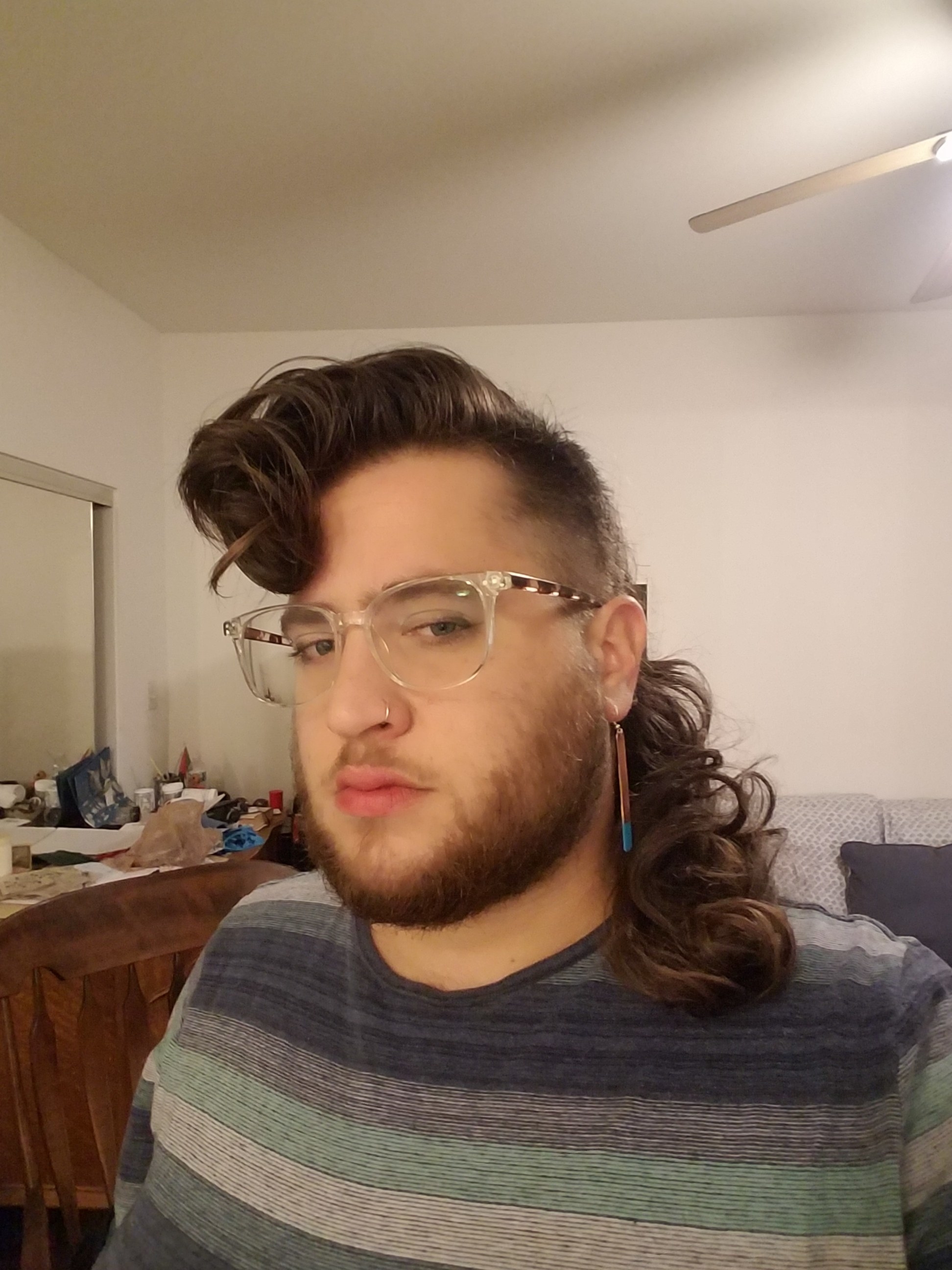
Ezra (they/them), 34, white and Jewish, Chicago, unemployed, former barista
I have worked in the service industry my whole adult life, mostly as a barista. I think I’m pretty lucky to have had mostly casual dress codes. I’ve only had to take out facial piercings for one place I think, but I never worked anywhere where that relaxed attitude seemed to extend to gender presentation. For three years before the pandemic (and my first three years on T), I worked downtown, and that was probably the most conservative culture I’ve worked in. That’s when I had to learn how often I needed to shave my face to pass versus how often I could shave it without leaving the skin raw.
I had been on T for almost three years when the pandemic started, but having been in customer service the whole time, and at the same job since before I started T, I never felt comfortable growing a beard, so I had never seen my facial longer than a few days I’d have off for work. So now I have a full beard! It’s been really exciting to watch it happen, and now I’ve gotten to the point where I feel pretty comfortable trimming it with clippers. I’m pretty hairy and I also have big boobs, so when it was hot earlier in the year, doing things like going out in a tank top was a major source of stress for me. I get really hot which makes me really anxious, so I’ll do almost anything to stay cool, but going out with size G breasts with lots of chest and shoulder hair makes me feel really nervous. Navigating that felt new this year.
I’m so lucky to have many other queer and trans people around me to talk to. A few of my closest friends are trans and/or queer, and I also am part of a group through a clinic that meets virtually once a week to chat about gender stuff. For Thanksgiving, we did a call and I decided to get a little “dressed up” and I put on makeup, which isn’t something I ever really did before I came out, and only a few times since, but I wanted to play with the look of my beard, my mullet, some new long, dangly earrings I got, and makeup. I was excited to do it, and then before the call, I got incredibly nervous! I almost chickened out. But I went through with it, and I got compliments from my friends and it was really affirming, though I was still very ready to get off the phone when it was over because I felt kind of exposed. I don’t think I would feel comfortable wearing that out of the house, even if it was just to go to an in-person gender group, and if it wasn’t for the pandemic, I wouldn’t be Zoom-chatting with people, so I just feel so lucky to have that space to play like that!
As a person who’s always worked in customer service, I don’t think I could have predicted the positive impacts that isolation would have on my mental health and gender identity stuff. In part because of unconscious trauma patterns as well as gender stuff, my life has always included so much performance, and so going from a stressful home to crappy relationships and the service sector has basically just meant a changing of the audience. For me, stepping into my gender and my identity (and my life) is about making those performances intentional as opposed to defensive and reactionary. With no audience but the one I choose, with my friends over Zoom, my internal sense of who I am has gotten clearer, and the fact that I interact almost exclusively with queer people just feels like it affirms my process as I go. This is certainly not to say that it has all been easy, but as far as the pandemic and isolation goes (and the privilege I have to be able to isolate, of course), I feel it’s been mostly positive. Of course I miss socializing, but I’m kind of a quiet, keep-to-myself, doesn’t-like-crowds person to begin with, and I’m not really interested in being physically intimate with people, so it may not be as hard for me as for others.
I’ve also had a heck of a time sending care packages to my friends through the UPS store that’s near my apartment. All of their employees needed some kind of special handling when it came to taking my personal information (my legal first name is Emma) — they should probably pay me to train their staff. One guy, who seemed really distressed, decided that someone else, someone named Emma, must have used my account to send a package recently. Sure, dude, whatever. ●
*Sheryl is a pseudonym.
